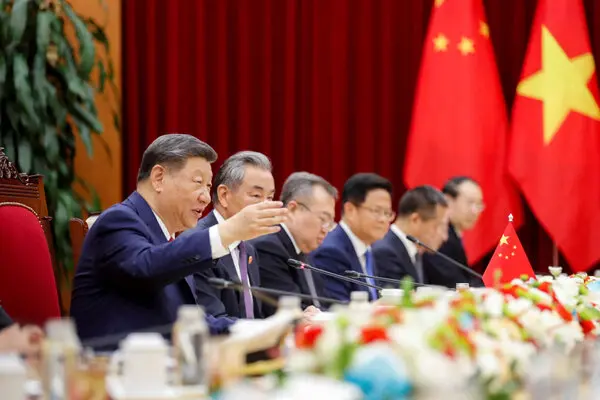Beijing has issued a stern warning to its trade partners, cautioning them against yielding to U.S. pressure aimed at isolating China amid President Donald Trump’s ongoing tariff offensive.
The move is part of China's broader diplomatic strategy, using both incentives and deterrents to sway countries caught in the rivalry between the globe’s top two economies.
Responding to reports that the Trump administration is urging other nations to limit trade with China in return for exemptions from U.S. tariffs, a spokesperson from China’s Ministry of Commerce made a strong statement on Monday.
"Peace is not achieved through appeasement, and respect is not earned through compromise," the spokesperson said.
They further criticized countries that might consider cutting deals at China’s expense for short-term benefits, comparing such actions to "asking a tiger for its skin", an act they warned would ultimately harm all parties involved.
"China strongly opposes any agreements that sacrifice its interests. Should that happen, we will not accept it and will respond with firm, reciprocal measures," the statement read.
This warning follows a diplomatic push by Chinese President Xi Jinping across Southeast Asia, where he positioned China as a dependable trade partner and a steady advocate for global commerce, offering a sharp contrast to the unpredictability and tariff policies of the Trump administration.
Countries and corporations are increasingly feeling the heat as they navigate the intensifying standoff between the United States and China.
The escalating trade war—marked by unprecedented tariffs from both sides—has rattled global markets, disrupted supply chains, and heightened fears of a global economic downturn.
On April 9, President Trump temporarily suspended his "reciprocal" tariffs on most countries for 90 days, while shifting the spotlight squarely onto China.
As part of this move, he hiked tariffs on Chinese imports to a record 145%. Many nations are now scrambling to renegotiate trade terms with Washington before the grace period ends.
China quickly hit back by raising tariffs on American goods to 125% and expanding its list of restricted U.S. companies, including more additions to its export control and unreliable entity lists.
In a bid to target critical sectors of the U.S. economy, Beijing also curbed the number of Hollywood films allowed in Chinese cinemas and returned at least two Boeing aircraft previously slated for Chinese airlines.
With the U.S. and China locked in a fierce tariff battle, neither leader is showing signs of backing down, as both aim to rally global support against the other.
According to a report from The Wall Street Journal last week, the Trump administration has been pushing U.S. trading partners to limit their economic ties with China as part of ongoing tariff negotiations.
Sources familiar with the discussions revealed that the U.S. plans to leverage these talks to extract commitments from its allies to help isolate China's economy, in exchange for potential reductions in trade and tariff barriers.
These measures include pressuring countries to prevent Chinese goods from transiting through their borders, blocking Chinese firms from establishing operations in their territories to avoid U.S. tariffs, and refraining from absorbing China’s low-cost industrial goods into their markets.
In response, China has been working to capitalize on the uncertainty and disruption caused by Trump’s policies, seeking to win over nations and build support for its position.
During his first foreign trip of the year, Xi Jinping visited Vietnam, Malaysia, and Cambodia, securing numerous bilateral agreements and pledging to support free trade.
These export-driven nations, which were hit by U.S. tariffs of up to 49%, benefited from the temporary suspension of those tariffs.

